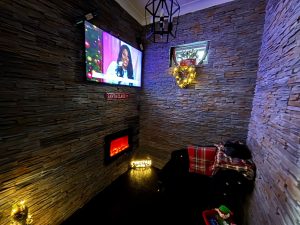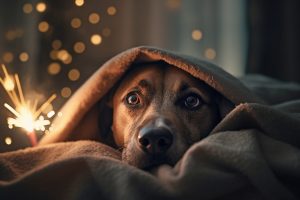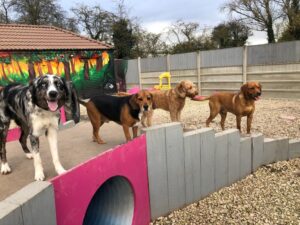
Dogs, Fireworks & Bonfire Night
Fun for you, but no fun for your dogs....
You hear the first bang of a firework echo across the street and you already know your dog’s heart rate just doubled.
Bonfire Night might be a celebration for people, but for dogs, it can feel like the end of the world.
Loud bangs, flashes of light, burning smells, unpredictable noises – it’s a sensory overload. For many dogs, it triggers pure panic. And if you’ve ever watched your pet trembling, hiding, or trying to escape through a closed door, you’ll know just how distressing it can be.
So how do you actually help your dog during fireworks? What about those long bonfire nights when neighbours let off loud rockets for hours?
Here’s the honest truth about what works, what doesn’t, and how to get through the season with less stress – for you and your dog.
Why dogs struggle with fireworks
To us, fireworks are entertainment. They’re loud, but they make sense. We know what they are, when they’ll start and when they’ll end.
Your dog doesn’t.
Imagine being suddenly surrounded by loud bangs, flashes of light, and strange smells – and you have no idea why. That’s what your dog is going through.
And it’s not just noise. The high-pitched whines, the vibration in the ground, even the smell of burning – it all feels like danger. A dog’s instinct is to run or hide.
Some dogs are more affected than others. Rescue dogs, nervous breeds, older dogs with hearing issues or vision problems, or even dogs who were fine last year might suddenly react badly. And once the fear is there, it can stick.
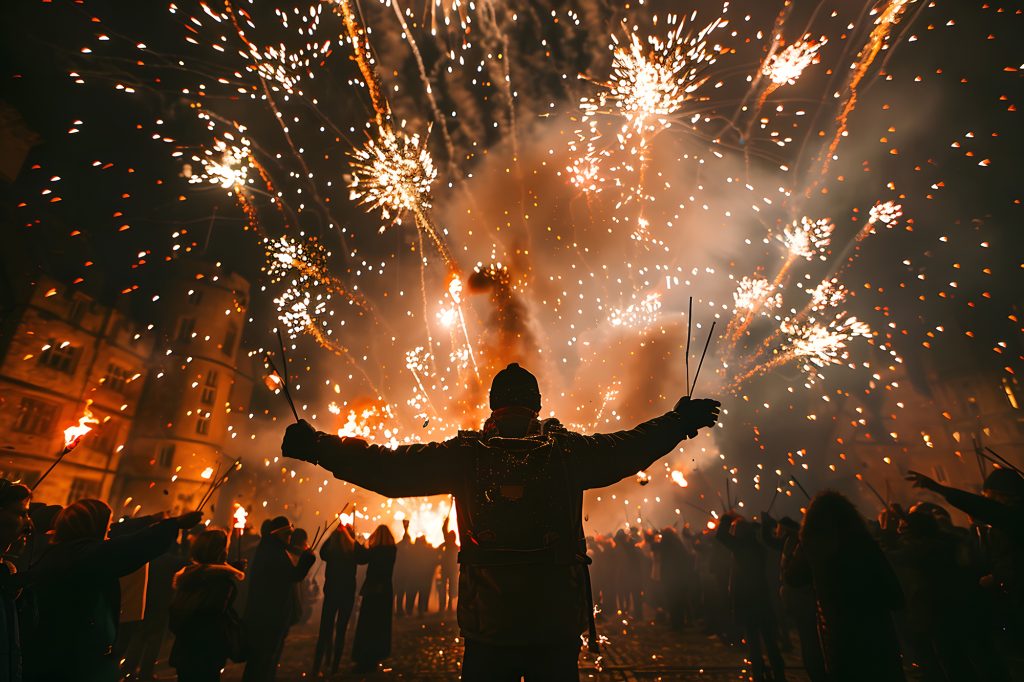
What fear looks like in dogs
Not all dogs react in the same way. Some shake, pant or drool. Others hide under beds, refuse to eat, or pace relentlessly.
Then there are dogs who bark non-stop, jump at every sound, or even try to bolt. Escapes happen every single Bonfire Night because a dog panics and breaks free.
There are also the dogs who just seem ‘off’. They might not show clear panic, but they’ll cling to you more, refuse to go out, or act withdrawn.
Don’t ignore those signs. If your dog seems uncomfortable, they probably are.
Preparing for Bonfire Night
You can’t stop the fireworks, but you can prepare your dog for them.
Start by acting early. Waiting until 5 November isn’t going to cut it. The fireworks usually start days before and continue after.
Close all windows, doors and curtains before it gets dark. That stops the flashing lights and muffles some of the noise. You can also put on the TV or play calming music to drown out the bangs.
Feed your dog early – some will skip meals when anxious. Make sure they’ve had a toilet break before dark, as many dogs refuse to go out once the bangs begin.
Create a quiet, safe space. Let your dog choose where to hide. For some, it’s under the bed. Others might settle behind the sofa. Don’t try to pull them out. Let them feel in control.
If you crate train your dog, cover the crate with a thick blanket and leave the door open. Put something that smells like you inside it. Familiar smells help.
Try to stay calm. If your dog sees you acting anxious or fussing over them too much, it can make things worse. Keep things low-key, speak softly and stay relaxed. If your dog wants to cuddle, let them. If they’d rather be alone, respect that too.
What about calming products?
There are dozens of sprays, plug-ins and calming products on the market claiming to help with fireworks. Some dogs respond really well. Others – not so much.
Adaptil diffusers release dog-appeasing pheromones which mimic the calming scent a mother dog gives off. They can help some dogs relax, especially if started a few days in advance.
There are also calming treats with ingredients like chamomile or L-theanine. Again, they can take the edge off, but they’re not a magic cure.
Thundershirts or calming wraps apply gentle pressure, like a hug. For some dogs, this works well. For others, it doesn’t do much. It’s worth a try, but test it well before the fireworks start.
The biggest mistake? Trying something new for the first time on Bonfire Night itself. If you’re going to try a calming product or aid, give it a trial run a few days beforehand.
Should you talk to your vet?
If your dog is absolutely terrified and none of the natural approaches are working, it’s time to speak to your vet.
There are prescription medications that can help dogs cope with severe firework anxiety. And this doesn’t mean you’re drugging your dog just to avoid a bit of barking. It’s about reducing extreme fear and giving them some relief.
Modern medications are much safer than older sedatives. Some reduce anxiety without knocking the dog out, so they’re still aware but not panicked.
Your vet can also rule out other issues. Older dogs with joint pain, cognitive decline or hearing loss might react differently to noise than they used to.
What about outdoor dogs?
If your dog normally lives outside, bring them in. Always.
No dog should be outside on Bonfire Night. It’s too risky. Fireworks can land in gardens. Dogs can escape fences in blind panic. And even the most confident dog can turn into a trembling mess.
Don’t take the chance.
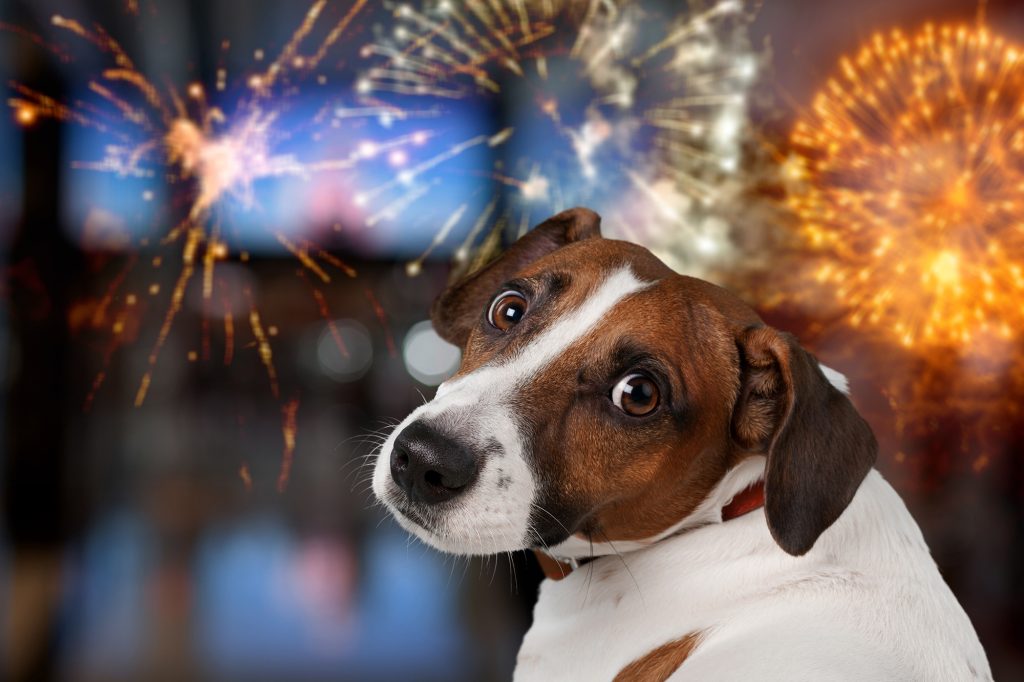
Don’t walk them in the evening
Plan your walks earlier in the day. If your dog’s routine is usually after dinner, change it during firework season.
You don’t want to be out when the first bangs start. Even a dog who’s never shown fear before can bolt if startled.
Always use a secure harness or collar and double check your dog’s microchip details are up to date.
What if my dog is already traumatised?
It’s not your fault.
If your dog has had a bad experience before, or they’ve built up a fear over time, there is still hope.
One approach is desensitisation. This involves playing firework sounds at a low level during the year – not just in November – and gradually increasing the volume over time. It takes patience and should be done outside firework season.
Pair the sounds with treats, play, or anything your dog enjoys. Over time, the brain rewires the association from “panic” to “okay, this noise means I get chicken”.
But it’s not a quick fix. It takes consistency and it’s best done with professional support.
Don’t punish fear
This should go without saying, but it still needs saying.
Never scold a dog for barking, shaking, hiding or acting up during fireworks. They’re scared. They’re not trying to be difficult. Punishing fear just adds more fear.
Instead, try to be your dog’s safe place. Be the one thing that stays calm and reliable when everything else feels out of control.
Help timid dogs feel safer all year round
Some dogs are nervous all the time, not just on Bonfire Night. If you have a timid or anxious dog, fireworks will just push them over the edge.
Start building confidence outside of firework season. Focus on routine, gentle socialisation, and low-stress environments. Use positive reinforcement training to reward calm behaviour.
Think of it like a bank. Every time your dog has a positive experience, you’re making a deposit. When something scary happens, like fireworks, they withdraw from that emotional bank. The more deposits, the better they cope.
A dog with confidence can learn to bounce back. A dog without it just crumbles.
You’re not alone
Thousands of dog owners dread Bonfire Night every year. It’s exhausting, emotionally draining and can feel helpless.
But you’re not failing if your dog struggles. You’re not spoiling them if you comfort them. You’re doing your best with a tricky situation.
So make a plan. Get prepared early. And know that this doesn’t last forever.
Some years will be worse than others. But every dog can learn to feel safer, one step at a time.
And if you need help, ask for it. Talk to your vet. Speak to a trainer. Reach out to someone who’s been there.
Because when it comes to helping dogs through firework season, doing something – anything – is always better than doing nothing.

